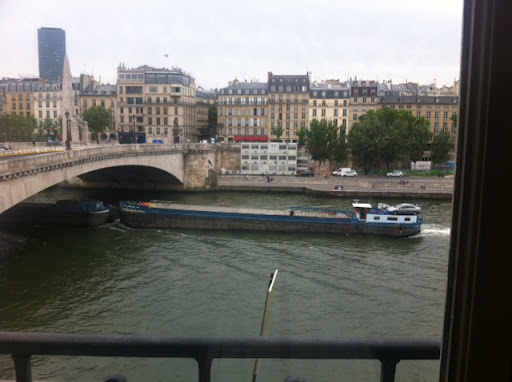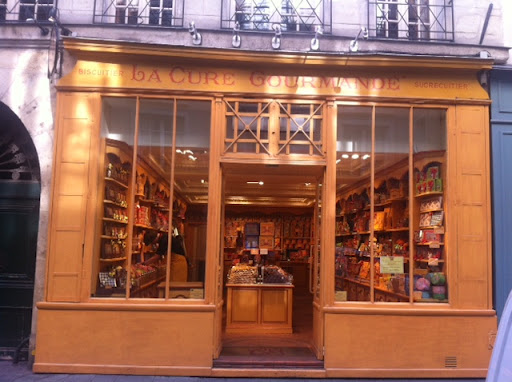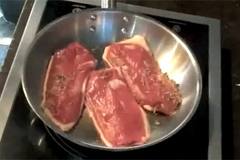Lavender Rubbed Duck Cooked in Paris
 |
| My view in Paris |
Paris was an unexpected treat (and a lot of hard work). I got the call from the same family I worked for at the shooting lodge in Northern England - could I be a companion and cook for the lady of the house while she visited Paris for a couple of weeks? Could I? I lept at the opportunity to finally COOK in Paris. Where before I always roamed the food markets and wistfully admired the beautiful displays of meat and vegetables and cheese, now I would have an excuse to so the shopping myself and prepare meals a la Parisienne.
 |
| An old-style sweet shop across from the boulangerie |
Each morning began with a quick trip to the boulangerie (and the very crabby boulanger) on the lovely Ille St. Louis where I was staying. Their home overlooks the Seine and the famous Left Bank. I could have just hit Notre Dame with a paper airplane flung out of my bedroom window and the famous Tour d'Argent restaurant was just a quick walk across the bridge. Bliss. Often I have trolled these narrow streets filled with tourists, eating my Bertillion ice cream while I window shopped (or "window licked" as the French call it) at some of the best food purveyors in the city. Now a fresh baguette ancienne (crustier on the outside than a plain old baguette) and fresh croissants accompanied me back to the house where I laid them out alongside some rosettes of salami, fresh butter, apricot jam, fruit salad and lots of coffee.Breakfast was easy. The challenges began when I was asked to produce meals at a moment's notice without knowing exactly where to go to actually find my ingredients. One night I promised scallops in an orange lavender glaze only to be told very haughtily by two different fishmongers that scallops were not in season. I suppose I've never thought of scallops having a season as they have always been readily available wherever else I've cooked. Leave it to the French - and not without credit - to dismiss any fish that's been previously frozen from their repertoir during the off-season. My elementary school French was constantly pushed to the limit by sellers who didn't normally have to deal with foreigners and didn't have much patience for my limited vocabulary. Yes, going to a French culinary school helped some, but coming up with the word dill escaped me and I found myself drawing a little picture on my hand to communicate.
 |
| They have the most gorgeous flowers on theisland but locals scoff at the prices |
The upside, and it was an enormous one, is the amount of prepared food available at an extraordinary quality. Rotisserie chickens were on offer at every butcher shop and offered with potatoes and vegetables covered in the chicken drippings. Delicious herb cured hams, marinated vegetables, pates, smoked fish. Interestingly, I didn't notice many of the prepared meals that are so prevelant in the US and UK. There are no frozen Hungry Man meatloaf meals or curry hotpots. Instead the prepared food is freshly made by each shop and it is up to the individual to put it together how they like. Preservatives and mystery meat just aren't tolerated.All of this aside, I was pretty pleased with the meals I produced during my two weeks in Paris and to be praised by Parisians who know their food made all of the running around well worth it. I've never been so nervous to cook for anyone as this group of wealthy ladies who really do do lunch (at the best places to be seen, mind you). Seems I passed the test.My favorite meal of the job is the following:
Here is the recipe for a Lavender Rubbed Duck Breast with Apricots and Sweet Onions that was inspired by Chef Jerry Traunfield at the Herbfarm in Seattle. To me you can't get more French than duck, lavender - and in apricot season, no less. Please, please give duck a go if you haven't because it's such a delicious meat that does the savory/sweet thing better than any other meat (except maybe pork). The key is to really render down the fat on the skin side of the breast. Give it a good 15 minutes on medium heat, watching it carefully so it doesn't burn. Also, allow the spice rub to penetrate the meat for at least four hours before cooking. It does make a difference.
 |
| This is how it should be done! |
serves 44 large boneless duck breasts2 tablespoons lavender1 tablespoon coriander seeds1 teaspoon fennel seeds1/2 teaspoon black peppercornszest of one lemon1 1/2 teaspoons saltUsing a mortar and pestle combine all of the rub ingredients and mash together as much as possible. Score the skin of the duck in a crosshatch pattern and rub the mixture into each of the duck breasts, getting into all of the nooks and crannies. Set them aside in the fridge for at least four hours but up to a day.1 tablespoon olive oil1 large Spanish onion, cut in thick slices8 fresh apricots1/2 cup white wine1/2 cup chicken brothsherry vinegar if neededPreheat your oven to 375 degrees. When you're ready to cook the duck heat a pan until smoking. Place the duck SKIN SIDE DOWN and don't touch it for several minutes. Keep the heat moderated so that you're not burning the skin - I often move the breasts around the pan to make sure they're all getting the same heat but your stove might be better than mine. Once the fat is rendered, turn the breasts over and allow to continue cooking for 3-4 minutes. Now put the breasts in an ovenproof dish, skin side up so it doesn't go soggy, and put in the oven.Drain all but two tablespoons of the fat from your pan and add the olive oil. Add your onions and allow to cook until soften, picking up all of the brown duck remains in the pan. Add the apricots and allow them to cook down a little bit - just 1 to 2 minutes. Now add the wine and broth and simmer until it reduces down by half. TASTE your sauce at this point and if you think it needs it add some vinegar and season with salt and pepper to your taste.A thermometer inserted in the duck breasts should read 135 to 140 degrees for medium which is the absolute most you should cook them. Place the breasts on a cutting board skin side down and cut into thick pieces. Turn the slices over, put them on your plate and spoon the sauce on right away.Note: Sorry no other pictures - I really was too frantic to stop and shoot any!!